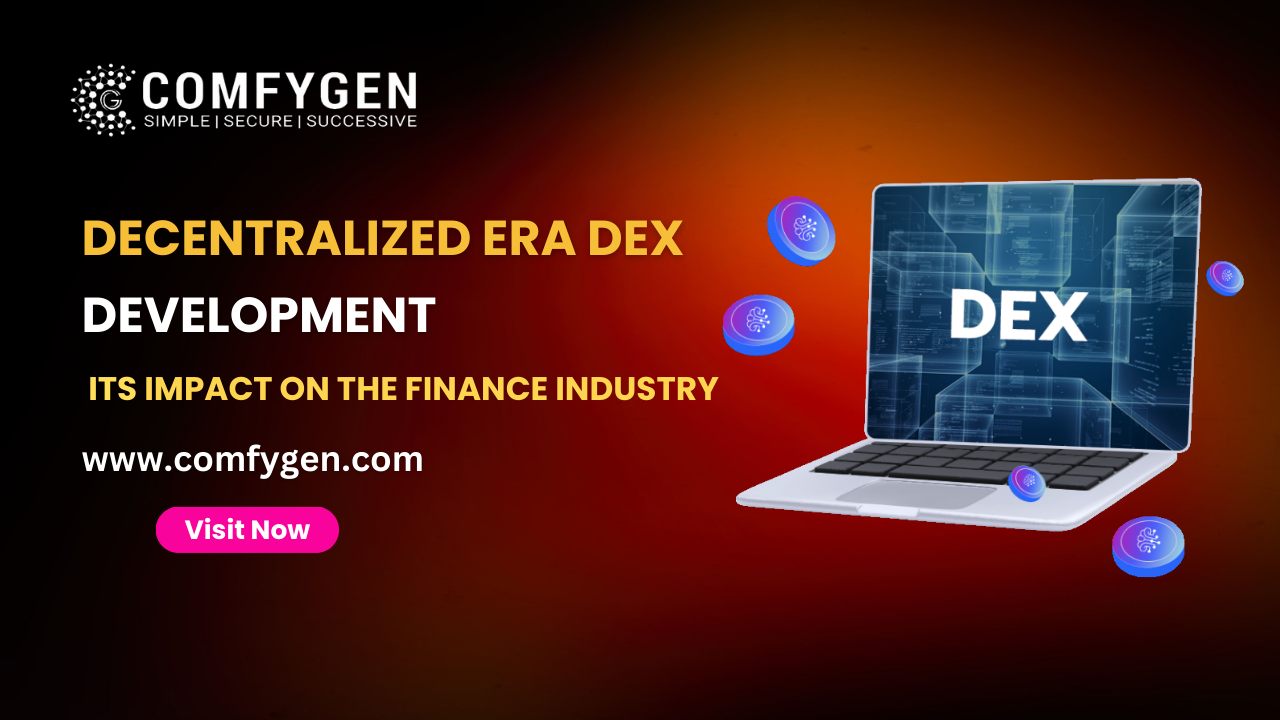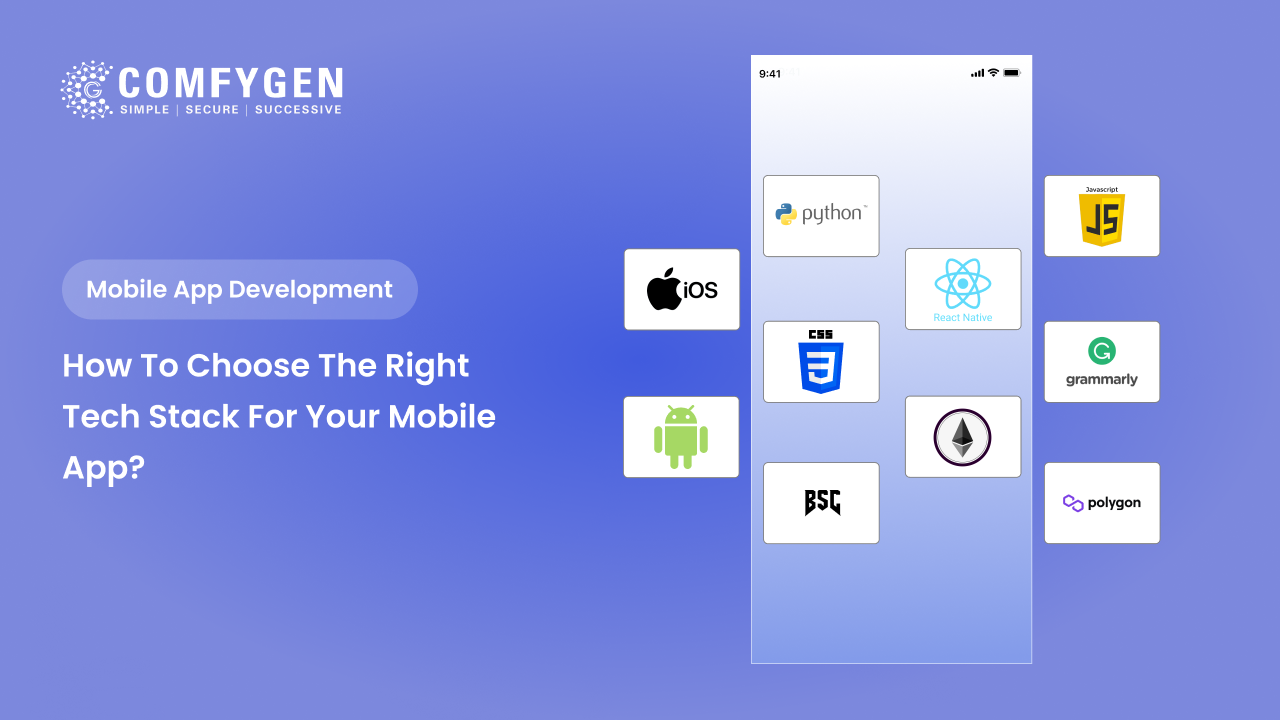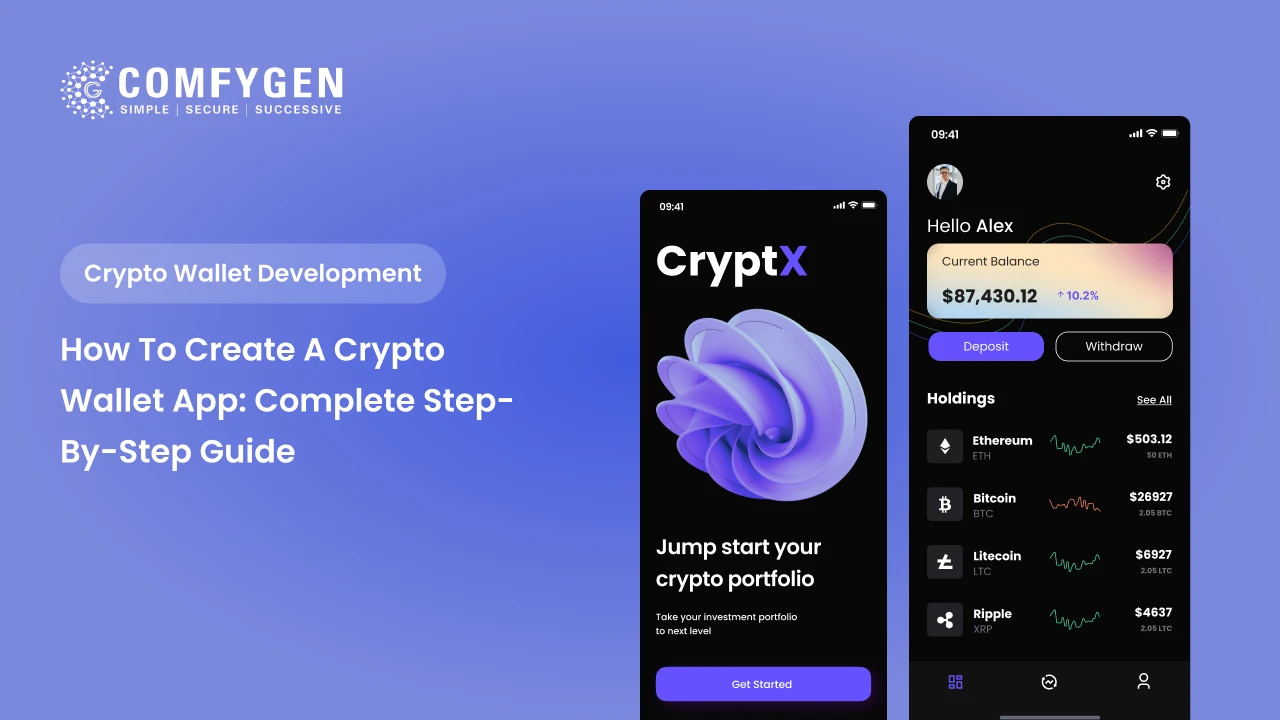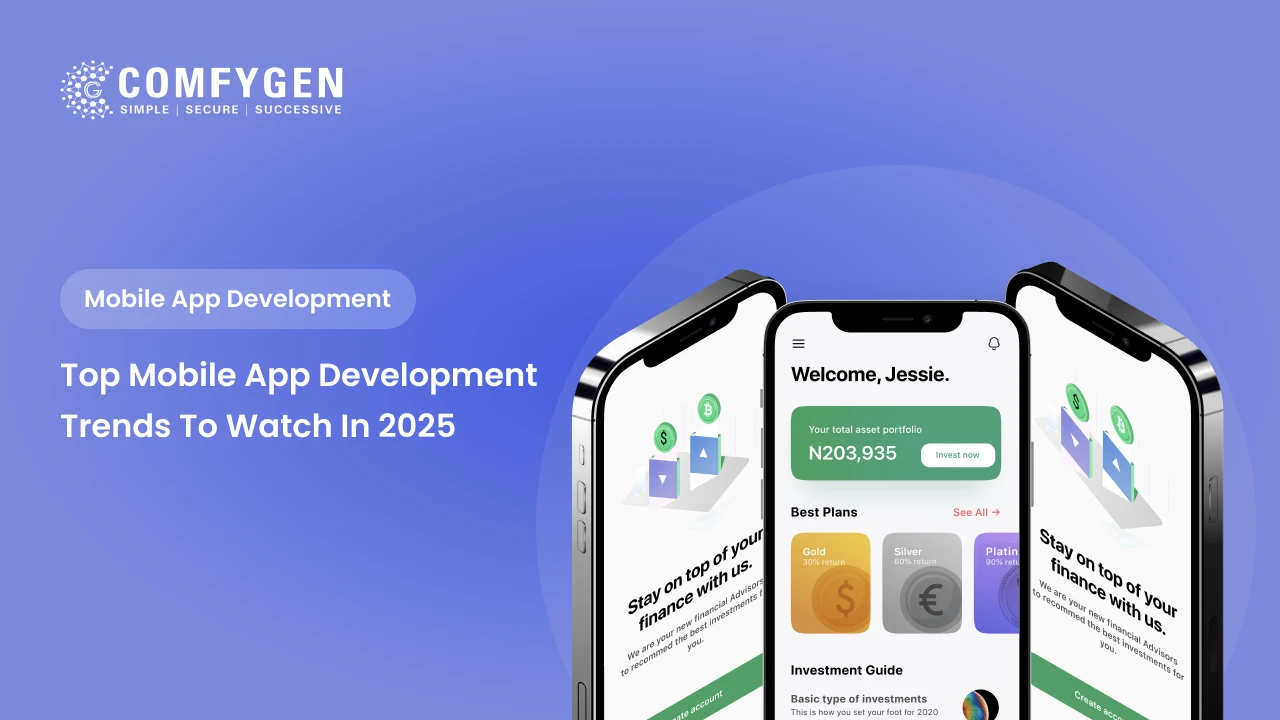Decentralized Era: DEX Development and its Impact on the Finance Industry
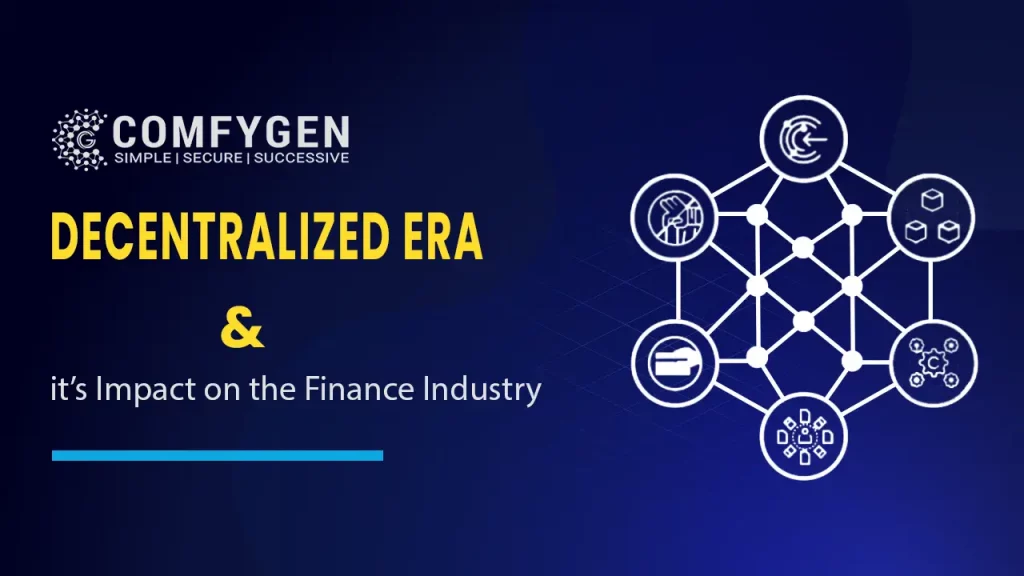
The rise of Decentralized Exchanges (DEXs) marks a transformative era in finance. DEXs operate without intermediaries, utilizing blockchain technology to facilitate peer-to-peer cryptocurrency trading. This disintermediation enhances security, transparency, and user control over funds. By removing reliance on traditional centralized exchanges, DEXs reduce the risk of hacks and improve privacy. Traders retain ownership of their private keys, mitigating custodial risks. However, DEXs face challenges such as liquidity and user experience. Despite this, their impact on the finance industry is substantial. They empower individuals globally to engage in borderless, censorship-resistant trading, reshaping the dynamics of financial markets and offering a glimpse into a decentralized financial future.
Introduction DEX Development
The development of decentralized exchanges (DEXs) involves the creation and expansion of systems that enable peer-to-peer cryptocurrency trading without the use of intermediaries such as traditional exchanges. The user-friendly interface, order matching algorithm, and secure asset exchange were all built by the developers. In particular, IA swaps must include smart contracts. Transparency is a priority in DEX development through the on-chain order book and settlement. As the DEX environment changes, developers work to incorporate cutting-edge features such as liquidity pools, token swaps, and cross-chain trading, enabling seamless trading of a wide variety of assets. DEX development as a whole fuels the growth of decentralized finance, encouraging greater financial inclusion and control for end users around the world.
The Importance of DEX Development:
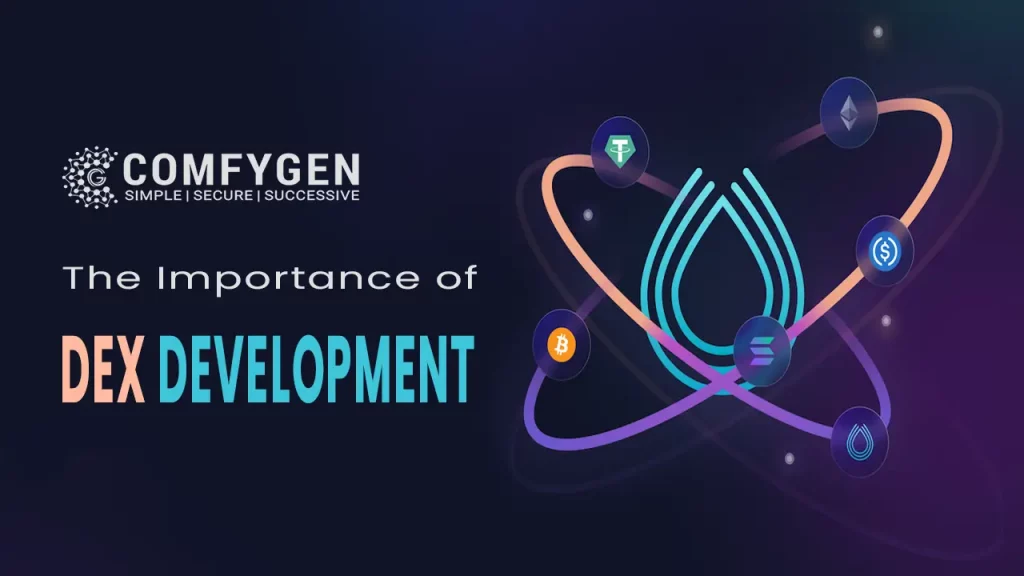
Peer-to-Peer DEX:
Peer-to-Peer decentralized exchanges enable direct trade between users using smart contracts.
Auto Market Maker:
On these systems, a user interacts with a smart contract that handles trade automatically rather than with other users. The smart contract controls a “liquidity pool” that stands in for a certain crypto trading pair. Users can supply liquidity to a pool in addition to exchanging assets.
Marketplaces:
These are a particular kind of decentralized trading platform that makes it easier to trade unusual assets like NFTs.
Read More: What is a DEX? How do Decentralized Exchanges Work?
Transforming the Finance Industry: Comfygen’s Impactful DEX Solutions
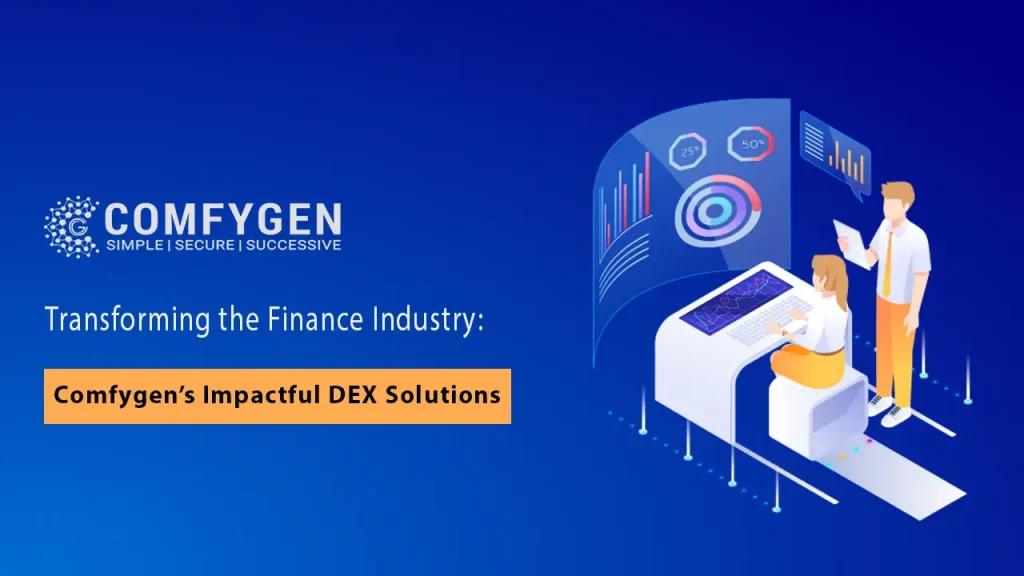
Through its ground-breaking Decentralized Exchange (DEX) solutions, Comfygen has been at the forefront of a revolutionary wave in the financial sector. ComfyGen’s DEX solution uses A Powerful Combination for Business Applications with blockchain and smart contracts to do away with middlemen and give consumers unmatched control over their assets and transactions. Access to decentralized finance (DeFi) is made more accessible by the user-friendly interface of Comfygen. Comfygen’s DEX solutions encourage greater financial inclusion by promoting peer-to-peer trading and minimizing the systemic risks connected with centralized exchanges. They have sparked a decentralized revolution that disrupts conventional financial assumptions and gives people more control.
Benefits of DEX Development with Comfygen
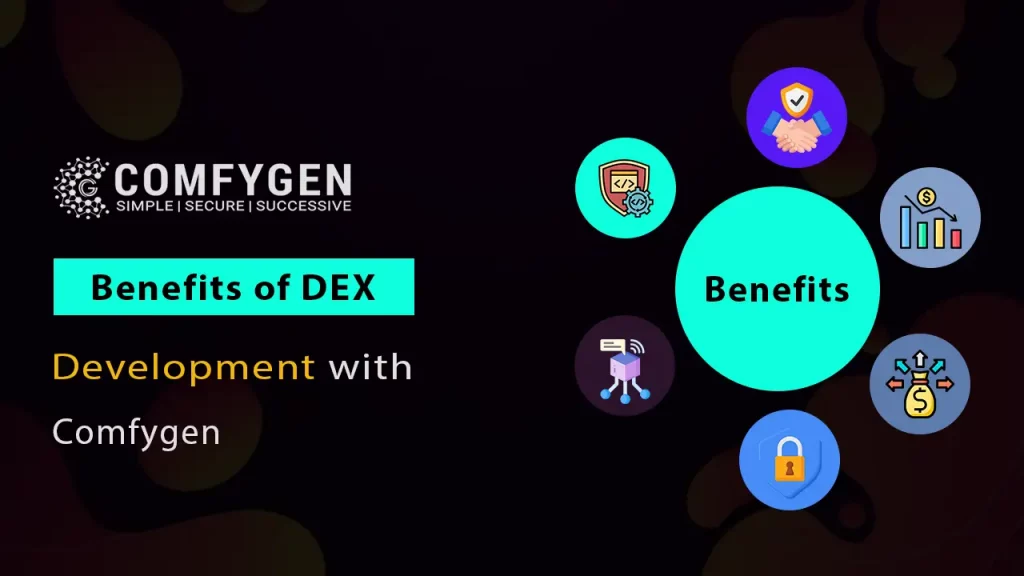
The Comfygen Decentralized Exchange (DEX) provides growth with enticing advantages. Without much coding experience, developers may quickly create effective DEX platforms thanks to its user-friendly interface. The platform’s modular architecture makes easy modification possible, allowing developers to easily adapt the DEX to different requirements.
Due to its interoperability with many Polygon Blockchain networks, a large market and user base are guaranteed. Furthermore, Comfygen’s substantial documentation and community assistance encourage group problem-solving and collaborative learning. Comfygen advances the growth of decentralized finance by enabling DEX development.
Decentralized exchanges (DEX) offer several benefits compared to traditional centralized exchanges. Here are some notable advantages of Decentralized exchanges (DEX) development:
Security: Decentralized exchanges (DEX) eliminate the need for a centralized authority to hold users’ funds, reducing the risk of hacks, data breaches, or exit scams. The funds remain in the users’ control through their private keys, making it less vulnerable to attacks.
Trustless Trading: Decentralized exchanges (DEX) allow users to trade directly from their Cryptocurrency Wallet without the need to deposit funds into a centralized exchange. This means users retain control of their funds at all times and can execute peer-to-peer transactions without relying on a trusted third party.
Privacy: Decentralized exchanges (DEX) provide a higher level of privacy by allowing users to trade without revealing their personal information. Users are typically not required to complete KYC (Know Your Customer) procedures, which helps maintain their privacy and reduces the risk of identity theft.
Global Access: Decentralized exchanges (DEX) have no geographical restrictions, enabling users from all over the world to participate in trading activities. There are no barriers to entry, and anyone with an internet connection can access and use a DEX.
Liquidity: Some Decentralized exchanges (DEX) leverage liquidity pools, where users contribute their funds to create a shared pool of liquidity. This allows for better liquidity compared to traditional exchanges, where liquidity depends on the order book. Automated market-making algorithms ensure continuous liquidity and reduce the risk of substantial price slippage.
Lower Fees: Decentralized exchanges (DEX) typically have lower trading fees compared to centralized exchanges. As there is no need for intermediaries or additional infrastructure, the costs are reduced, resulting in lower fees for users.
Interoperability: Decentralized exchanges (DEX) are often built on blockchain protocols that support interoperability. This means users can trade assets from multiple blockchains, enabling cross-chain swaps and expanding the range of available trading pairs.
Openness and Transparency: Decentralized exchanges (DEX) are usually open-source projects, allowing anyone to review the code for security and transparency. This fosters community involvement and peer review, which is crucial for maintaining trust in the platform.
It’s important to note that while DEXs offer numerous benefits, they also have some limitations, such as potential liquidity issues, slower transaction speeds compared to centralized exchanges, and a steeper learning curve for new users. Nonetheless, the advantages mentioned above make Decentralized exchanges (DEX) development an appealing option for those who value increased security, privacy, and control over their assets.
Comfygen’s Approach to DEX Development
When approaching comfygen as a DEX (Decentralized Exchange) development firm, it’s important to follow a strategic and professional approach to ensure effective communication and collaboration. When opting for Comfygen’s approach to DEX development, you are embracing a path of innovation and expertise. Comfygen’s team combines their deep understanding of blockchain technology with a proven track record in decentralized exchange development. Their meticulous attention to detail, comprehensive understanding of security protocols, and commitment to staying at the forefront of industry trends ensure a DEX solution that’s not only technologically advanced but also user-friendly and secure. By choosing Comfygen, you’re aligning your project with a partner that values collaboration, transparency, and delivering results that exceed expectations in the ever-evolving landscape of decentralized finance.
DEX Development Services Offered by Comfygen
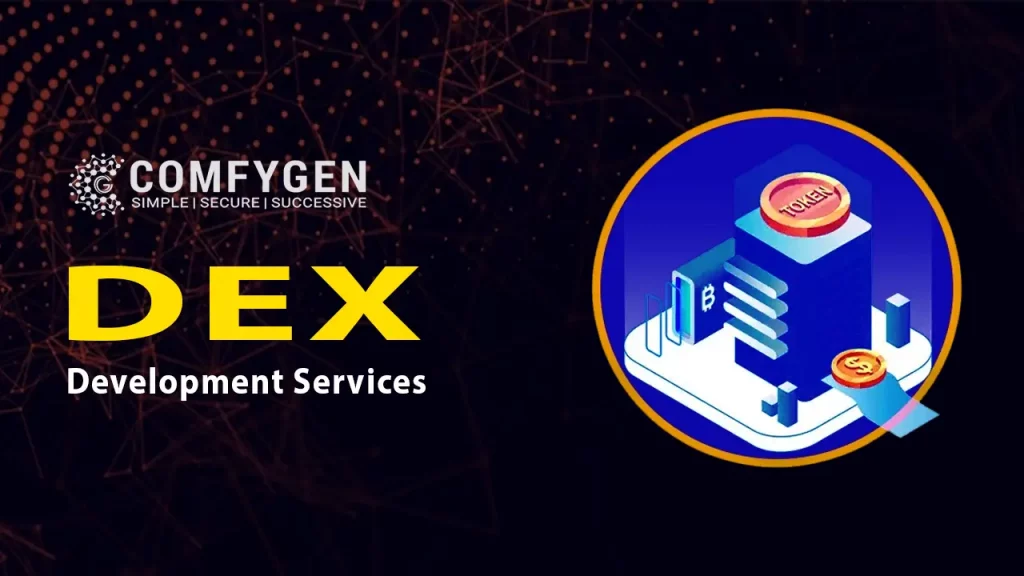
Decentralized exchange (DEX) development services are offered by Comfygen, a reputable company that offers all-inclusive solutions to fulfill the rising need for reliable and effective cryptocurrency trading platforms. Comfygen specializes in creating a user interface that is simple and easy to use, ensuring a smooth trading experience. Their adept blockchain engineers use strong Smart Contract protocols to foster more customer confidence and enable safe and untouchable transactions.
In order to facilitate the trade of different cryptocurrencie tokens, Comfygen specializes in connecting numerous blockchain networks. Safety is still Comfygen’s first priority. By offering end-to-end DEX solutions, Comfygen enables companies and entrepreneurs to take part in the decentralized financial revolution and innovation that will define the future of finance. Comfygen keeps up with new trends and technologies in the fast changing blockchain ecosystem. enables you to participate.
Custom DEX Development
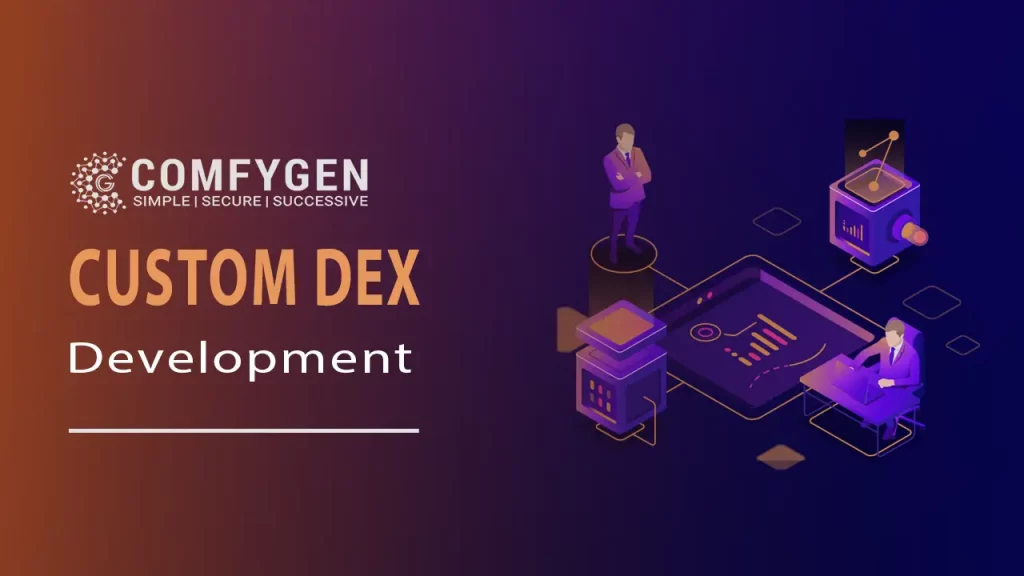
The process of developing a custom decentralized trading platform for cryptocurrencies and digital assets is known as custom DEX (Decentralized Exchange) development. The process entails creating the frontend and backend code for the platform, integrating smart contract technology for safe and automated trading, and putting in place user-friendly interfaces for trading, account management, and asset custody. Individual DEX Development The security of users’ finances and data is additionally ensured by protections including audit trails and two-factor authentication. In order to support the platform’s expanding user base, the development process also entails speed, responsiveness, and scalability optimization. Overall, the goal of bespoke DEX development is to offer traders a distinctive and effective trading experience.
UI/UX Design
User interface (UI) and user experience (UX) design elements that are utilized by decentralized cryptocurrency exchanges (DEX) are referred to as DEX UI/UX design. DEXs are systems that allow cryptocurrency trading between users directly, without the use of a middleman.
Clear and responsive design features in the user interface (UI) provide simple navigation, display of trading pairs, order book, and account information.
The complete platform experience for merchants is covered by the UX component. This includes an easy onboarding procedure, thorough starting lessons, and sophisticated tools made for seasoned traders.
Transparency of information is another priority of the DEX UI/UX design, which clearly displays trading fees, slippage risk, and token specifics. An effective trading experience is facilitated by real-time information, a customized dashboard, and cutting-edge trading tools.
Tokenization Solutions:
Tokenization is being used by businesses all around the world as a data protection measure to make sensitive data insensitive and safe. To capitalize on this potent data protection technology, several security firms and other service providers have begun to provide their own tokenization services.
Tokenization capabilities, however, might range significantly between providers and implementation strategies. Many businesses just provide tokenization as a supplemental service rather than specializing in it.
Decentralized Finance (DeFi) Development:
Development of financial services and apps that run on blockchain networks is referred to as decentralized finance (DeFi). DeFi intends to provide a variety of trustless and automated financial services, including loans, borrowing, trading, and yield farming. use of smart contracts DeFi systems improve the accessibility and inclusivity of the international financial markets by facilitating peer-to-peer transactions. Decentralized apps (DApps), protocols, and DeFi smart contracts are all created and coded by developers in the DeFi ecosystem. DeFi development as a whole seeks to alter the financial environment, giving people greater control over their assets, and build a more transparent and democratic financial system. to promote ecosystem innovation.
Smart Contract Development and Audit:
A smart contract audit is a thorough examination of the programmed agreements included in a smart contract. A smart contract is made up of functions and data that are automatically performed whenever a network tries to access it in order to carry out a transaction that a user has requested and the conditions agreed upon by both parties are satisfied.
Blockchain Integration:
Using information from connected back-end systems, this cutting-edge technology provides an immutable record of transactions, speeding corporate processes and enhancing security.
Every Blockchain Software is really simply a network of decentralized, distributed databases.
Ethereum Token is among the most well-known blockchains. It is distinct from others, like bitcoin, in that it stores much more on the blockchain than just a record of financial transactions. Smart contracts are also supported by the Ethereum blockchain, allowing for the execution of more complex transactions that may or may not be based on specified events.
Decentraland uses the Ethereum Blockchain-based Computing Platform for DApps to monitor the ownership of trade goods and digital assets. Scene state and player location are two examples of things that are not recorded on the blockchain because they must change in real time as the player interacts with a scene.
Blockchain Consulting and Strategy:
Blockchain unlocks value when it comes to shared data by doing away with intermediaries, automating procedures, and fostering trust and transparency. Innovation in business models, operational effectiveness, risk management, and social impact are all necessary for capturing that value.
Will the success of our own solution require the participation of an ecosystem of other players? If so, how can we make sure that everyone receives enough value to make travel affordable for all.
Embracing the Decentralized Era:
Industries at the Forefront of DEX Adoption:-Decentralized exchanges (DEXs) have been widely used across several industries as a result of the decentralized age. These platforms do away with the need for middlemen by giving consumers improved privacy, security, and ownership over their assets. Peer-to-peer lending, borrowing, and yield farming are made possible by the DEX through smart contracts on platforms like Compound and Aave. DEX is now used for gaming and non-fungible tokens (NFTs). Furthermore, as DEXs enable safe trade of commodities and resources, supply chain management is becoming more open and effective. As the decentralized era develops, DEX adoption continues to shake up established systems.
Advantages of Choosing Comfygen as Your DEX Development Partner
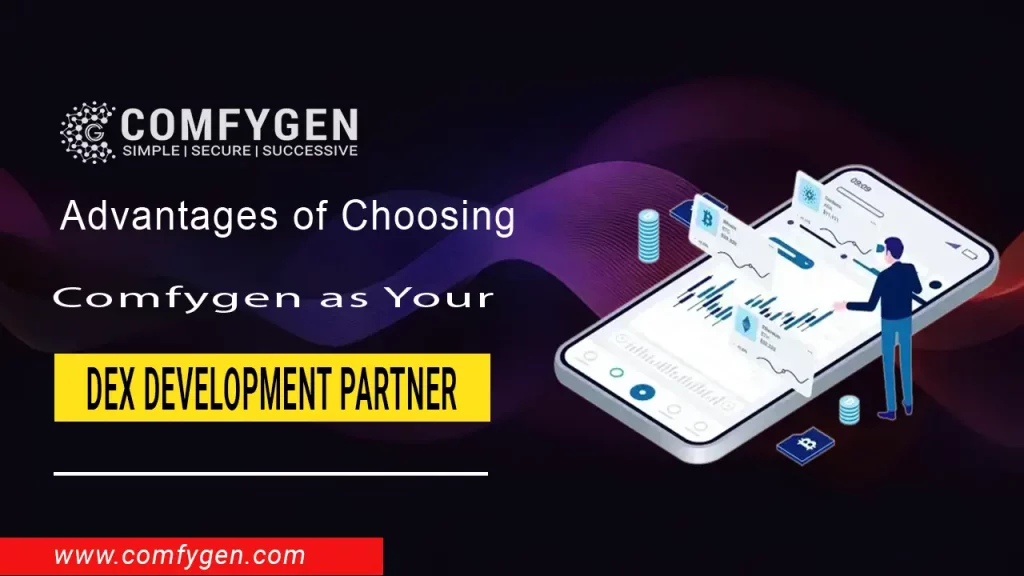
With its many advantages, the ComfyGene DEX (Decentralized Exchange) stands out as an excellent choice for development collaborations. The development of smart contracts by Comfygen’s expert team ensures the reliability of transactions and business. They incorporate cutting-edge features like liquidity pools, yield farming, and NFT support, strengthening the platform’s competitiveness, with a thorough grasp of DeFi developments. Additionally, their thorough testing and quality assurance procedures lead to deployments that are bug-free. Comfygen presents itself as a dependable partner by open communication and prompt project delivery. A creative, safe, and fully functional DEX, prepared to compete in the dynamic world of decentralized finance, is ultimately ensured by selecting Comfygen.
The Future of DEX Development
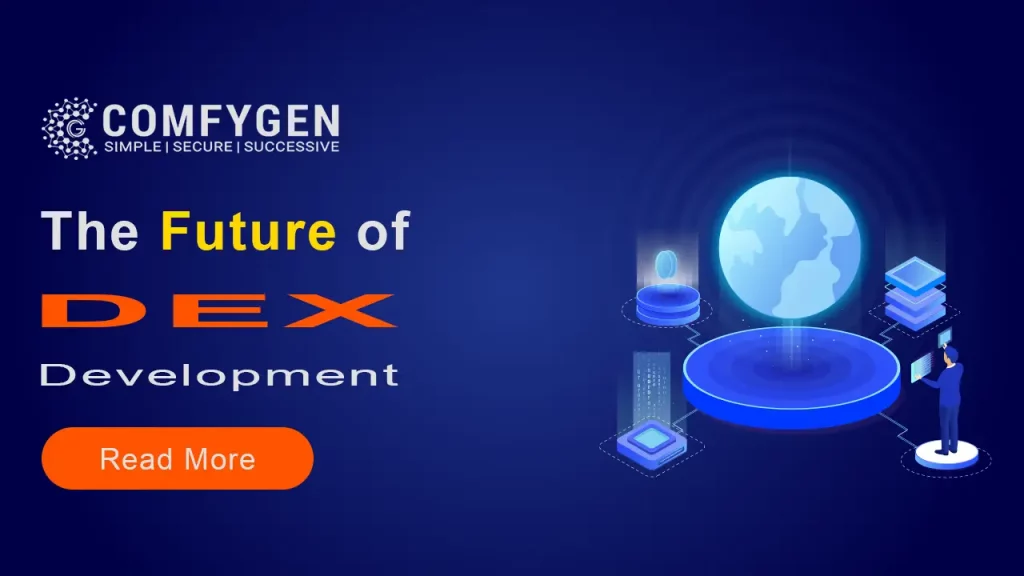
Future decentralized exchange development has a huge potential for disruption and additional innovation. Information on new developments and trends in DEX technology will be presented in this area. Decentralized identity integration, the emergence of non-fungible tokens (NFTs) and their effect on DEXs, and the possible influence of decentralized cross-chain exchanges are some of the subjects that will be explored.
Conclusion
Decentralized Exchanges (DEXs) are cryptocurrency trading platforms that use smart contracts to enable buy or sell orders.It is not surprising that DEXs are becoming more and more popular as they provide a number of important benefits over centralized exchanges.Comfygen specializes in creating a user interface that is simple and easy to use, ensuring a smooth trading experience. Many businesses just provide tokenization as a supplemental service rather than specializing in it.

Mr. Saddam Husen, (CTO)
Mr. Saddam Husen, CTO at Comfygen, is a renowned Blockchain expert and IT consultant with extensive experience in blockchain development, crypto wallets, DeFi, ICOs, and smart contracts. Passionate about digital transformation, he helps businesses harness blockchain technology’s potential, driving innovation and enhancing IT infrastructure for global success.
Based on Interest

Blockchain Consulting Services: Transforming Your Business with Cutting-Edge Blockchain Solutions
Introduction Blockchain technology is revolutionizing industries by providing secure, decentralized, and transparent solutions. As businesses across the world explore their potential,…

